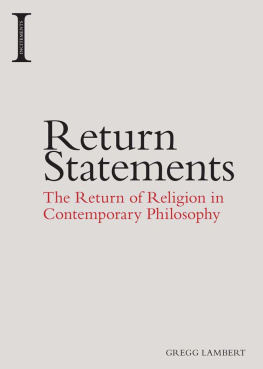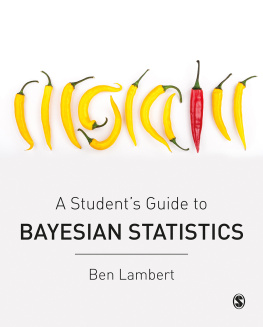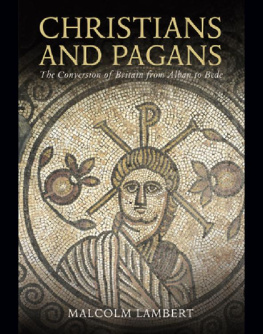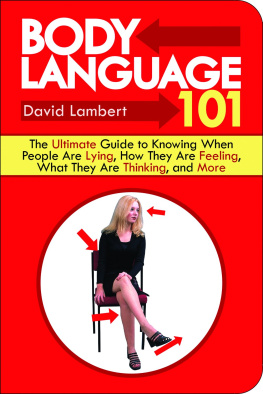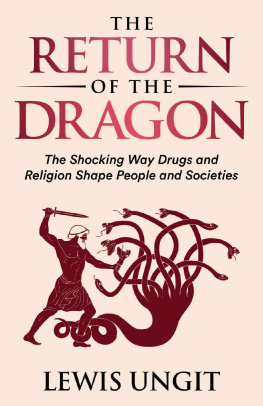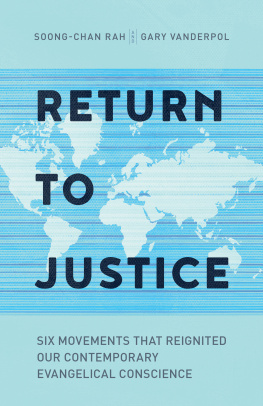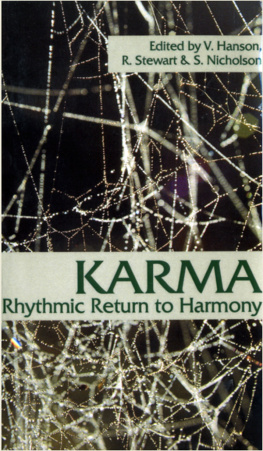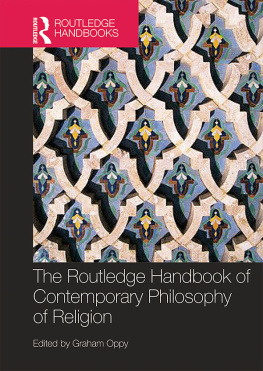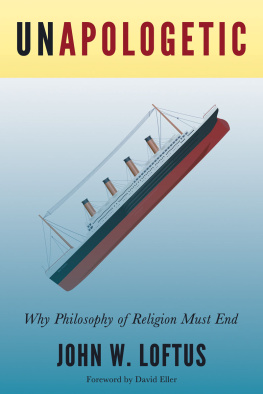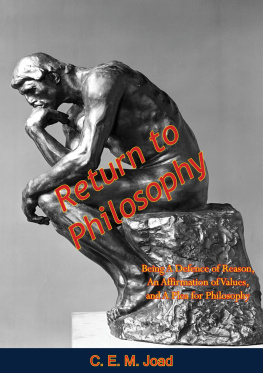Lambert - Return statements: the return of religion in contemporary philosophy
Here you can read online Lambert - Return statements: the return of religion in contemporary philosophy full text of the book (entire story) in english for free. Download pdf and epub, get meaning, cover and reviews about this ebook. City: Edinburgh, year: 2016, publisher: Edinburgh University Press, genre: Religion. Description of the work, (preface) as well as reviews are available. Best literature library LitArk.com created for fans of good reading and offers a wide selection of genres:
Romance novel
Science fiction
Adventure
Detective
Science
History
Home and family
Prose
Art
Politics
Computer
Non-fiction
Religion
Business
Children
Humor
Choose a favorite category and find really read worthwhile books. Enjoy immersion in the world of imagination, feel the emotions of the characters or learn something new for yourself, make an fascinating discovery.
Return statements: the return of religion in contemporary philosophy: summary, description and annotation
We offer to read an annotation, description, summary or preface (depends on what the author of the book "Return statements: the return of religion in contemporary philosophy" wrote himself). If you haven't found the necessary information about the book — write in the comments, we will try to find it.
Lambert: author's other books
Who wrote Return statements: the return of religion in contemporary philosophy? Find out the surname, the name of the author of the book and a list of all author's works by series.
Return statements: the return of religion in contemporary philosophy — read online for free the complete book (whole text) full work
Below is the text of the book, divided by pages. System saving the place of the last page read, allows you to conveniently read the book "Return statements: the return of religion in contemporary philosophy" online for free, without having to search again every time where you left off. Put a bookmark, and you can go to the page where you finished reading at any time.
Font size:
Interval:
Bookmark:

Return Statements
Incitements
Series editors: Peg Birmingham, DePaul University and Dimitris Vardoulakis, University of Western Sydney
An incitement is a thought that leads to a further thought or an action that solicits a response, while also testing the limits of what is acceptable or lawful. The books in this series, by prominent, world class scholars, will highlight the political import of philosophy, showing how concepts can be translated into political praxis, and how praxis is inextricably linked to thinking.
Editorial Advisory Board
tienne Balibar, Andrew Benjamin, Jay M. Bernstein, Rosi Braidotti, Wendy Brown, Judith Butler, Adriana Cavarero, Howard Caygill, Joan Copjec, Simon Critchley, Rebecca Comay, Costas Douzinas, Peter Fenves, Christopher Fynsk, Moira Gatens, Gregg Lambert, Leonard Lawlor, Genevieve Lloyd, Catherine Malabou, James Martel, Christoph Menke, Warren Montag, Michael Naas, Antonio Negri, Kelly Oliver, Paul Patton, Anson Rabinbach, Gerhard Richter, Martin Saar, Miguel Vatter, Gianni Vattimo, Santiago Zabala
Available
Return Statements: The Return of Religion in Contemporary Philosophy
By Gregg Lambert
The Refusal of Politics
By Laurent Dubreuil, translated by Cory Browning
Plastic Sovereignties: Agamben and the Politics of Aesthetics
By Arne De Boever
From Violence to Speaking Out
By Leonard Lawlor
Forthcoming
Agonistic Mourning: Counter-Memory and Feminist Political Dissidence in Post-Yugoslavia
By Athena Athanasiou
The Return of Religion in
Contemporary Philosophy
Gregg Lambert

Edinburgh University Press is one of the leading university presses in the UK. We publish academic books and journals in our selected subject areas across the humanities and social sciences, combining cutting-edge scholarship with high editorial and production values to produce academic works of lasting importance. For more information visit our website: www.edinburghuniversitypress.com
Gregg Lambert, 2016
Edinburgh University Press Ltd
The Tun - Holyrood Road, 12(2f) Jacksons Entry, Edinburgh EH8 8PJ
A CIP record for this book is available from the British Library
ISBN 978 1 4744 1393 0
The right of Gregg Lambert to be identified as the author of this work has been asserted in accordance with the Copyright, Designs and Patents Act 1988, and the Copyright and Related Rights Regulations 2003
(SI No. 2498).
I wish to thank the following editors of the journals and collected volumes where previous versions of some of these statements appeared: Jeff Di Leo, Victor E. Taylor, Carl Raschke, Kevin Hart, Yvonne Sherwood, Jack Reynolds, Rosi Braidotti, Bolette Blaagaard, Eva Midden, Irving Goh, and Verena Conley. I also wish to acknowledge the original occasions and the organizers of public statements: Jeff Di Leo, who organized the original panel on the theme of discouragement for the 2005 meeting of the American Comparative Literature Association in State College, Pennsylvania, where I delivered the first return statement; Clayton Crockett, who organized the roundtable on the work of Jack Caputo for the 2003 meeting of the American Academy of Religion in Atlanta, Georgia, where I delivered the second return statement; Gail Hamner, who organized a panel on the Continental Philosophy of Religion for the 2002 meeting of the American Academy of Religion in Toronto, Ontario, where I delivered the third return statement; finally, Timothy Murray, Director of the Society for the Humanities at Cornell University, for inviting me in 2010 to deliver the sixth return statement on Derridas Faith and Knowledge.
I would also like to thank Timothy Campbell and Philip Goodchild for reviewing an earlier version of the manuscript, and for their ongoing faith and encouragement; and especially my friend and colleague, Jeffrey T. Nealon, who has witnessed all of the various seasons of life that have motivated these reflections, and who has served as the most faithful companion and occupant of the bar stool immediately to my right since 2001. Thank you, Jeff, for always being there. Finally, I wish to acknowledge my former teachers, who have always inspired and challenged my thinking: Jacques Derrida, my only teacher; Jean-Luc Nancy, who first believed that the 1989 Loma Prieta earthquake was only the trembling of his own thought; and Herman Waetjen, who taught me everything I know about the early Christian communities.
I am grateful to Peg Birmingham and Dimitris Vardoulakis for their enthusiasm in including this title in their series, Incitements, and to Carol Macdonald, commissioning editor at Edinburgh University Press, for her experience and professionalism. I would like to thank Sophie Chapple for her careful editorial assistance in preparing the final script, and Bresser-Chapple for compiling the index and final corrected proofs; Tim Clark, for not missing an iota; and Iris Van Der Tuin, who has been both a wellspring of affirmation and a veritable source of key quotations from the philosophy of Bergson.
In Memory of
Charles E. Winquist, 4 April 2002
(friend, human, all too human)
Most books are written with a clear statement in mind, usually in the space of a few years, as if to emulate a thought that unfolds as a continuous and unbroken element. This book is not among them. Rather, it has been patiently assembled from a series of public lectures, articles, essays, and chapters either written or delivered over the first decade of the millennium, falling roughly between the spring of 2002 and fall of 2012, all of which address the internal logic of what I call the return statement in contemporary philosophy.
This logic has three distinct senses or levels. On a first level, most of the statements that follow were written in response to what had commonly been referred to as the post-secular turn in continental philosophy and contemporary theory, which had been unfolding in North America and the United Kingdom during this period, even though there is a tradition that dates to a much earlier period in French phenomenological circles, namely from the early 1980s. My critical response to this phenomenon was primarily motivated by a series of questions concerning its relationship to another sense of the post-secular turn that was taking place globally following 9/11. I wondered, for example, how these two returns of religion could be taking place in such proximity to one another without being directly linked, like the same horizon viewed from opposing perspectives of the globe. From one perspective the horizon is viewed as evening, from another, as a new dawn.
Even more troubling was the fact that different senses of the term religion (from the Latin religio) were being ascribed to these dual horizons of the post-secular. According to the first horizon, the semantic and cultural meaning of religion was weakening and philosophically pacific (though not necessarily pacifist). However, from the second horizon mostly ascribed to the Islamic world, even though other so-called fundamentalisms (or what Jean-Luc Nancy calls integrisms) were also gaining popular support in both North America and Europe a literal meaning was reattached to the term, as if religion in this sense was the most direct signification of the phenomena and could not, for that reason, undergo any possible metaphorical substitution as, for example, standing for culture or belief-system. From the horizon of the morning of the next day, on the other hand, the weakening of the sense of religion opened up a number of new semantic possibilities for other terms like community, faith, love, and God. Thus, weakness was also presented as a method of striking out or crossing through the literal sense of the term: religion, as if by means of this operation, the signifier remained legible, but liberated from its historical representatives and institutional apparatuses. Consequently, it became possible for one to proclaim ones faith without necessarily being religious, just as one could be a militant without proclaiming violence, or even become a fanatic without necessarily becoming a fundamentalist (as in the case of the philosophical fanaticism proclaimed by Badiou as a new-found passion for the Universal concerning the idea of Communism, albeit a communism without community). In many instances, however, the new terms offered to replace the literal inscription did not evoke any bond, oath or allegiance; they required only the most abstract proclamations of faith, truth, love, community, and hope. Thus it seemed that the only mortal enemies were the literal and historical senses of each of these terms, senses which seemed to belong only to the other horizon, or to the evening of the last day that was now setting on the West.
Font size:
Interval:
Bookmark:
Similar books «Return statements: the return of religion in contemporary philosophy»
Look at similar books to Return statements: the return of religion in contemporary philosophy. We have selected literature similar in name and meaning in the hope of providing readers with more options to find new, interesting, not yet read works.
Discussion, reviews of the book Return statements: the return of religion in contemporary philosophy and just readers' own opinions. Leave your comments, write what you think about the work, its meaning or the main characters. Specify what exactly you liked and what you didn't like, and why you think so.

